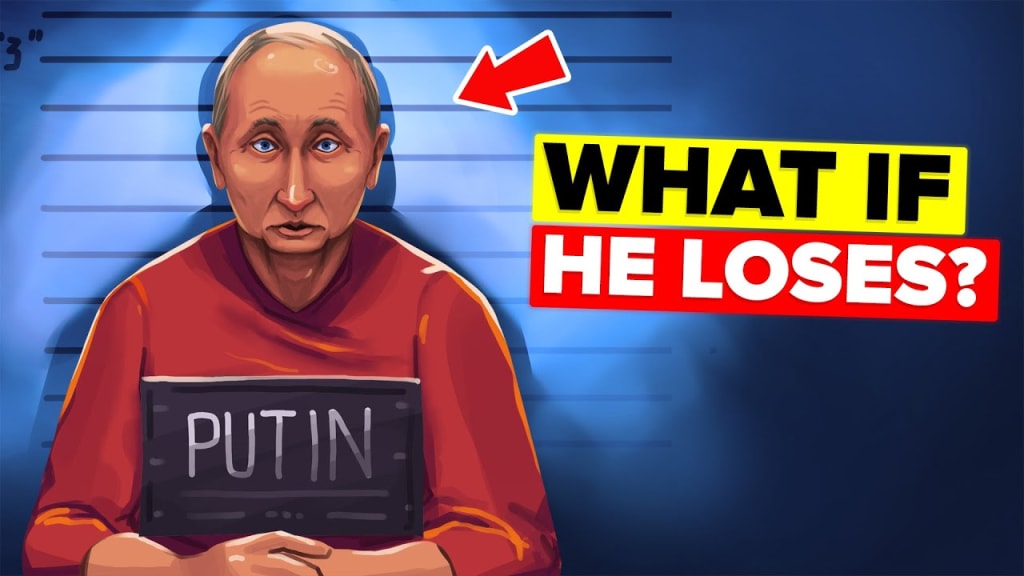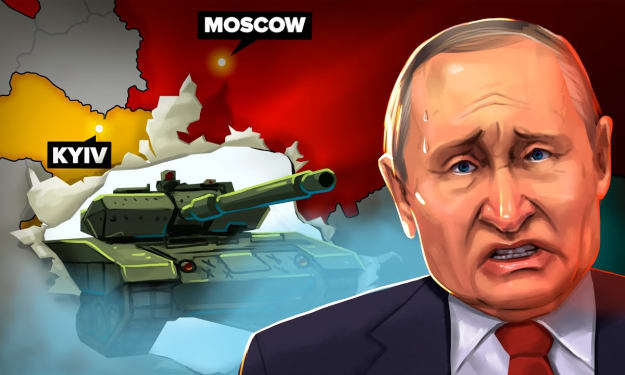What will become of Putin if he loses the Ukraine war?
What would happen to Putin if Russia lost the Ukrainian war? Get a take on this spectacular narrative, which delves into the ramifications of Vladimir Putin's aggressive assault of another nation. 🥵🤐😰

What would happen to Putin if Russia lost the Ukrainian war? Get a take on this spectacular narrative, which delves into the ramifications of Vladimir Putin's aggressive assault of another nation. 🥵🤐😰
The war has not gone in Russia's favor since it invaded Ukraine. It is evident that Putin will not succeed in de-nazifying Ukraine any time soon given the over 100,000 fatalities, tens of thousands of vehicles destroyed, and harsh sanctions imposed on the Russian economy. Russia is likely to lose the war in Ukraine, either through a blatant military defeat or a humiliating settlement. But it still begs the question: What happens to Putin if he loses? The short answer is probably nothing, and here's why. Putin's ruthlessness as a statesman is the main factor in why he is unlikely to be removed from office. In the years following the fall of the Soviet Union, Russia experienced a difficult and dramatic period.
The fragile government of the 1990s was controlled by a small group of people known as oligarchs and was characterized by record unemployment, super inflation, and a severe crime wave. The oligarchs in Russia didn't all come from the same region or family. The oligarchs, in contrast, were simply individuals who took advantage of their pre-existing connections in the Soviet Union to either outright steal state enterprises or buy them for absurdly low prices. Overnight, every industry you could think of went private, including the production of natural gas and oil, as well as rail systems, commercial factories, food producers, and more. These early, opportunistic businesspeople established their own monopolies in their respective industries by using coercion, shrewd trade alliances, and bribery.
The government led by Boris Yeltsin was unable to stand in their way because the oligarchs held such sway solely because of their financial resources. Instead, as long as the oligarchs helped keep the government financially afloat and funded all of Yeltsin's cronies' campaigns, the government acceded to their demands. Putin's first run for president was one of the campaigns backed by the oligarchs. Despite being well-known in St. Putin was a stranger to the national stage at the time and resided in Petersburg. Putin won the 2000 presidential election as a genuine dark horse candidate thanks to Boris Yeltsin's support and the funding from the oligarchs. Putin launched his own campaign against the oligarchs shortly after becoming president, despite gleefully accepting their financial support for his campaign.
Putin hated the influence the oligarchs had over the government and wanted to change that. Putin invited the 21 richest oligarchs to Moscow in the summer of 2000 to deliver a personal message from him to the other oligarchs. Putin made it abundantly clear in that private meeting that the only reason the oligarchs are still in power today is because he gave them permission to do so. Putin allegedly told them that he would allow them to continue living in luxury as long as none of them challenged his plans, sought to become politicians, or opposed his will. He would personally see to it that they were made penniless, put in jail, or killed if they disobeyed. Putin was put to the test soon after that meeting when an oligarch who owned the country's first independent newspaper began making fun of him on a television program he was hosting.
The oligarch was imprisoned for defrauding the government of $10 million shortly after the premiere of the first episode, and his business was sold to a Putin ally for pennies on the dollar. Over the following two decades, Putin would keep going after oligarchs. Since the invasion, Putin has targeted oligarchs more aggressively than ever before, imprisoning or killing a number of them. At least ten oligarchs have been murdered or mysteriously discovered dead since February 2022. Despite the differences between each case, they were all united by their vehement opposition to Putin and the conflict. The only other entity that could challenge Putin is a group called the Siloviki, if the oligarchs, who are supposedly the ones in Russia with all the money and power, can't or won't do anything, then who could.
The phrase "Siloviki," which means "men of force," was first used to describe the group of Putin's allies who support him in running the nation about ten years ago. Putin established a fiercely devoted group of oligarchs who were directly responsible to him after making it clear that they would not rule over him. Since 2000, Putin has been systematically adding trusted confidants that he personally chooses to his list. These carefully chosen men are each given a successful company to run. His cronies and their families have amassed enormous wealth from these relationships, and the majority of these businesses have strong ties to state-ordered contracts. Despite ruling over their own territories in Russia, the siloviki share a few traits.
First of all, almost every one of these men has served in the Russian or USSR military, police force, or intelligence agency. Putin's steadfast allies who served alongside him early in his political career include those who lack this experience. Regardless of where they come from, they are all utterly loyal to Putin. They can get close to him because of their loyalty. Even though there are between 400 and 1000 oligarchs in Russia, there are only a few dozen siloviki. The entry requirements are strict because it is such a prestigious club. Ramzan Kadyrov, the head of the Chechen Republic, and Yevgeny Prigozhin, Putin's chef and de facto leader of the paramilitary Wagner Group, both aspire to be members of this club but haven't succeeded in getting in.
People like Ramzan Kadyrov and Yevgeny Prigozhin are frequently discussed in the news as if they are jockeying to become Russia's next president. The siloviki, however, are only present because Putin permits them to, which is something they do not comprehend. The siloviki, in contrast to the oligarchs, are given opportunities to speak with and advise Putin. They are unable to question his authority, though. This dynamic makes it impossible for the siloviki to overthrow Putin without nearly universal agreement. Given their extensive network of connections in the military, police, and business worlds, it might be possible for them to get away with it. Given that some have been ardent Putin supporters practically since Putin's childhood, this is improbable.
After all, with almost 150 million citizens, the Russian people outnumber the handful of cronies in power by a wide margin. So, if even the siloviki would not overthrow Putin, what about the Russian people? A popular uprising is improbable, though, given Putin's reputation as a ruthless statesman. In addition to the large-scale exodus of hundreds of thousands of Russian men who chose to avoid the draft, there has been some very vociferous public opposition against Putin, ranging from street protests in large numbers to even shootings at recruitment centers. However, as one activist put it, the Putin regime is better at quelling protests than they are at putting them together.






Comments
There are no comments for this story
Be the first to respond and start the conversation.